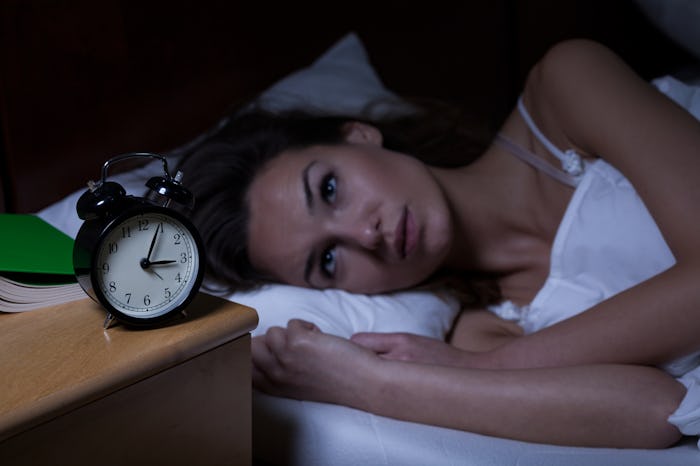Life

The Tiny Thing That Could Help With Insomnia
Trying to function after you've had several sleepless nights in a row is one of the worst feelings in the world. You feel groggy, completely brain dead, and maybe in a bad mood. Even worse — extreme tiredness can be really unsafe. Insomnia can negatively impact your life and your health in some pretty monumental ways. Treating your repeated sleeplessness might take a little more than counting sheep, but not that much more. So what is the tiny thing that could help with insomnia?
It's first important to realize that persistent sleep problems are not rare. According to a 2016 report done by the Centers For Disease Control And Prevention (CDC) more than a third of American adults aren't getting enough sleep on a regular basis. Of course, adequate sleep levels vary person to person, but the same organization recommended that adults should get an average of seven hours of sleep at night. The Sleep Foundation explained that many people go in and out of bouts of insomnia, especially if the insomnia is stress related (and not medication or substance related).
Basically, at one time or another, you may have a period where you aren't sleeping well and the deficit adds up. If this happens you may start to look at your lifestyle for ways to stop the insomnia.
The small thing you could do right away is to stop using your smartphone, tablet, computer, or television right before bed. No doubt you've heard this before, but screen time, especially before bed, can really mess with your sleep. According to Web MD, reading on the computer or watching TV before bed can stimulate you, not make you sleepy. The site explained that the light and noise from these devices can reduce brain melatonin levels. Melatonin is a hormone made by your body that helps you with your daily sleep cycles, as explained on the National Sleep Foundation's website. It increases in the evening after the sun goes down making you sleepy, then wears off in the early morning waking you up. It might be really tempting to surf the internet before bed, check Facebook, watch a television show you enjoy to relax, or even check your email one last time, but if you want to sleep it's best to stay away.
Instead of turning to your devices, there are other relaxing and sleep-inducing activities you can try to help you wind down. Help Guide suggested reading as a way to relax, but not on a device. People laugh at me for still going to the library and picking out actual books or buying books, but I literally can't read books from a screen because it will keep me up forever. Other suggestions included listening to soothing music, meditative breathing, turning down the temperature in the room, and making the lights dim.
Dealing with persistent sleep problems is no fun and can really impact your life, mood, and overall health. As mentioned, if the simple fixes and advice from your doctor don't work you may have to try some more invasive treatment options that include prescription medication. Considering how many side effects some medications carry it's at least worth it to try small things first when trying to favorably impact your sleep cycle. These small methods can often carry a big and positive payoff.